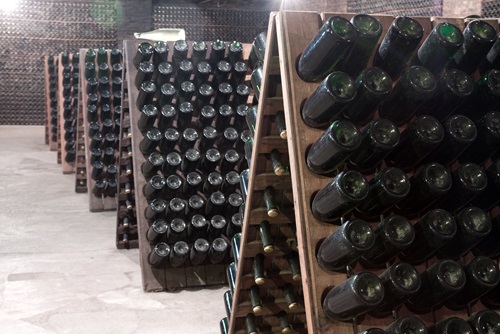Wine time with Master Sommelier Andrew McNamara Part 2
Dec. 9, 2016

 Breakthru Beverage is fortunate to have someone on staff with the depth and breadth of wine knowledge that Andrew McNamara brings to the table. McNamara serves as the Chairman of the Court of Sommeliers, in addition to his duties as Director of Fine Wines for Breakthru Florida. We posed five questions to McNamara about where he sees the industry going and advice for consumers on how to best enjoy a wine (Hint: it starts with opening the bottle)
Breakthru Beverage is fortunate to have someone on staff with the depth and breadth of wine knowledge that Andrew McNamara brings to the table. McNamara serves as the Chairman of the Court of Sommeliers, in addition to his duties as Director of Fine Wines for Breakthru Florida. We posed five questions to McNamara about where he sees the industry going and advice for consumers on how to best enjoy a wine (Hint: it starts with opening the bottle)
Breakthru: Why is wine gaining popularity with American consumers?
Andrew McNamara: To me, it’s a life cycle. We saw wine consumption throughout Europe start to fall. As that started to fall, it started to pick up a little bit in the U.S., and we’re now the largest wine consuming nation. We have really great wines coming from some lesser-known regions, and we have individuals who are willing to embrace that.
Breakthru: Do you have any advice for consumers who are trying to better appreciate wine or to get over the fear of uncorking a bottle?
AM: At the end of the day, it’s a bottle of wine. It’s something that’s meant to be enjoyed. The only way to know what you like is to taste and drink a lot of different things and not be afraid to step out. You might spend $10, $15, $20 or more on a bottle of wine, and maybe it’s not your favorite. But, if you figure out why it’s not your favorite, that might be even more valuable than if you found something just like what you’re always used to drinking. You can step out of those things.
There are a lot more people willing to help individuals get an idea about what styles they’re going to like and what’s going to be best for them. I think that’s a huge thing. It’s not for me or anyone else to say that what someone likes to drink isn’t great. It’s up to the individual that’s drinking it. If they like it, then that’s wonderful. It doesn’t matter whether I like it or not, it’s about whether you like it. You, as a consumer, can learn a couple of these terms by going to wine classes at wine shops or in restaurants. Go and learn a little about the language of what we as sommeliers taste and smell, and don’t be afraid to use it. Don’t be afraid to be wrong. I want more people to drink great wine. And great is not defined by the dollar.

Breakthru: What do you think about Pinot Grigio and why do you think it’s a popular wine?
AM: Pinot Grigio, to me, is one of those wines that is misunderstood. It is a phenomenal glass of wine. It is a great grape. Where we see a lot of the great Pinot Grigio’s come from northeastern Italy. We tend to think about Italian Pinot Grigio as one lump category, but it’s really not. A lot of Pinot Grigio is grown in the incredibly steep mountainside terrace vineyards in places you would never think to grow grapes, and it ends up on your table at a relatively inexpensive price.
The wines are incredible. At the same time, it can make wine that’s really easy and approachable and very easy to sip and just have a glass. It’s a great grape because it goes very well with a large number of food items.
You can have it really anytime you want to have it. You see Pinot Grigio from California, and some from other parts of the U.S., that are a little bit bigger and bolder and have a little bit more intensity to them and that’s great. They’re fantastic wines. It tends to be a more neutral varietal. And by neutral, I mean not quite as polarizing.

Breakthru: Are you drinking anything lately just for enjoyment and not for work?
AM: Always. It’s always a blurred line. I enjoy wine, that’s why I got in the business. To be honest, I spend a bit more time drinking spirits than I do wine just because I spend so much time around wine. I drink a lot of brown spirits, whiskeys and the like. From a wine perspective, I tend to drink California wine. I really love California Chardonnay. I’ll drink Napa Cabernet Sauvignon all the time. In the same vein, I’ll drink very neutral Italian whites that aren’t necessarily the most complicated but they’re clean and crisp and really pretty, and really good with food.
Breakthru: What advice would you give to those trying to develop an appreciation for wine?
AM: We’re in this business and we’re adults. Some of us get frustrated sometimes that we can’t automatically pick out things that are going on in a glass of wine or understand a specific term or understand all the different terminology and what that means and how that impacts your palate. And what I’ll say to that is give it time. We spend years and years and years going to school learning how to use our brain and very little time focusing on how to use our noses and our palates and our eyes to assess what we’re eating and drinking. When you begin to focus on that, it still takes years and years to really be able to develop those skills. It’s an interesting dynamic when you bring that up, because people don’t think about it that way. “We’ve been eating and drinking our whole lives, we should be good at it.” Well, yeah we might be good at eating and drinking, but we may not be very good at picking out and talking about the foods that we’re eating and drinking.
This interview has been edited for space.
Read Part 1 of our discussion with Andrew McNamara